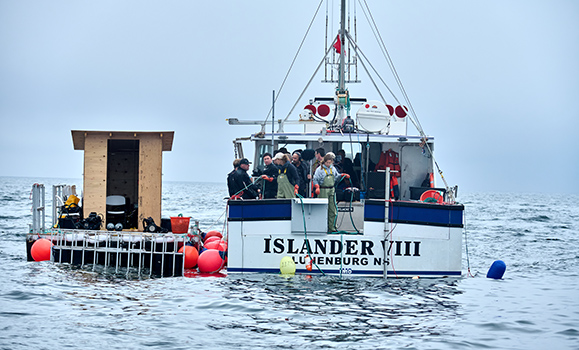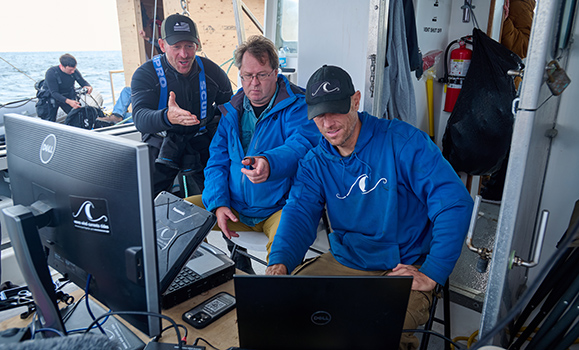When you think of the global hotspots for great white shark sightings, places like South Africa, Australia, Mexico, or California likely come to mind.
Now a new locale is making its way onto that list: the south shore of Nova Scotia, which by many accounts is seeing an influx of the apex predators every year.
Talk of a rising great white shark population has traveled along the East Coast in recent years, from scores of shark sightings to a fatal encounter involving a dog. Nova Scotia recently decided to post shark warning signs on its beaches, citing the increase in great whites as a potential safety risk. The phenomenon has prompted researchers, fishers, and experts to examine why so many of the fabled species are choosing to venture north into Atlantic waters.

Their work is being showcased in a new 40-minute documentary that brought together members of the Flower fishing family in Lunenburg, N.S. with shark expert and Dal veterinarian Dr. Chris Harvey-Clark to conduct a ground-breaking research expedition.
“The Mount Everest of sharks”
has its world premiere during Shark Week on Discovery Canada, Discovery US, and Discovery + on Wednesday, July 10, 2024.
The crew involved in the documentary also includes underwater cinematographer and Discovery Shark Week legend Andy Casagrande, oceanographer Greg Trowse, shark research pioneer Dr. Greg Skomal, and is led by award-winning filmmaker P.J. Naworynski.
 "The great white shark is the Mount Everest of sharks," says Dr. Harvey-Clark (pictured). "It's bigger, meaner and toothier than any other shark in the ocean. Since about 2018, we've seen all kinds of wacky things we didn't see before. A dog eaten before its owner while duck hunting. Deer attacked swimming between two islands. Numerous white sharks washing up dead on beaches. Nova Scotia is perfect ambush country for white sharks and there are seals all over the place. We're past half a million seals, so the table is set.”
"The great white shark is the Mount Everest of sharks," says Dr. Harvey-Clark (pictured). "It's bigger, meaner and toothier than any other shark in the ocean. Since about 2018, we've seen all kinds of wacky things we didn't see before. A dog eaten before its owner while duck hunting. Deer attacked swimming between two islands. Numerous white sharks washing up dead on beaches. Nova Scotia is perfect ambush country for white sharks and there are seals all over the place. We're past half a million seals, so the table is set.”
Using an array of underwater cameras, groundbreaking early advance multi-beam sonar imaging, ROV cameras, underwater acoustic technology and drone photography, the team will prove that not only are great whites here, but in numbers that no one could have previously imagined.
Answering questions about sharks in our region
The expedition also breaks new ground in expanding our knowledge of these elusive animals. Many questions remain: how many great whites are visiting Nova Scotian waters and for how long? Are they reproducing here, or just summer visitors feasting on seals and tuna? What role does climate change play in the proliferation of sharks north of the 49th parallel? Are these curious juveniles carving out new territory, or mature breeding adults that are expanding their range? What impact are they having on the local ecosystem, and does their presence mean the North Atlantic Ocean is becoming healthier?

"The increase in great whites in Atlantic Canada is fascinating," says Naworynski, a Canadian Screen Award-winning director of films like Love at the Bootcamp and Disasters at Sea. "It's such a thrill to join the research team and savvy local fishermen to chronicle their encounters.
"The detailed database of images and research our team is compiling will help us all learn more about how big the population is, why great whites are migrating to Canadian waters and the best ways to keep people safe from the potential dangers of swimming with sharks."
first airs at 9 p.m. Atlantic (8 Eastern) this Wednesday, July 10 on the Discovery Channel, and can subsequently be viewed on demand or .

